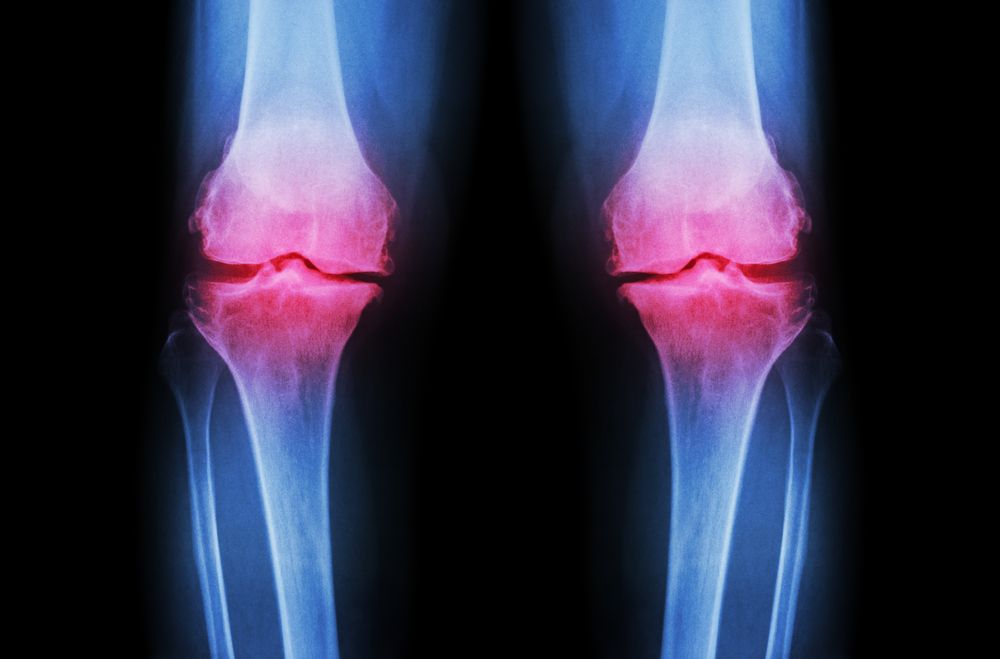Article
Hyaluronic Acid for Knee Osteoarthritis
Intra-articular hyaluronic acid may be suitable as treatment for knee osteoarthritis, a review shows. The findings are inconsistent with many of the clinical guidelines.
Knee OA (©PuwadolJaturawutthichaiShutterstock.com)

A review published by Maheu et al. in Seminars in Arthritis and Rheumatism supports injected intra-articular hyaluronic acid for knee osteoarthritis treatment. The findings are inconsistent with many of the clinical guidelines, which the authors reported are often cautious or dismissive of a treatment that is widely embraced by practitioners, particularly in older populations who do not tolerate analgesics and nonsteroidal anti-inflammatory (NSAID) agents, and where multiple comorbidities and polypharmacy may interfere with such treatments.
Results of this meta-analyses showed efficacy in 13 of 17 randomized control trials, which the authors regarded as “overwhelmingly positive.” Although providing only moderate symptom relief, they reported that “IAHA (hyaluronic acid) may offer one of the best benefit/risk ratios among pharmacologic options, as measured by improvements in knee osteoarthritis health outcomes, overall gain in quality-adjusted life years and substantial delays in time to total knee replacement.”
A previous meta-analysis by some of the same authors looked at common interventions such as paracetamol, NSAIDs, analgesics and symptomatic slow acting drugs for osteoarthritis. While they were all superior to placebo for pain management, hyaluronic acid had the greatest effect and paracetamol-a widely used first-line therapy-had the least.2 The benefits appear to be maintained over the long term, with 80 percent of patients continuing to respond to subsequent injections over three years.4
Maheu and colleagues pointed to demonstrated safety of multiple courses of hyaluronic acid given over periods of six to 18 months, compared to safety concerns to chronic use of paracetamol as analgesia, due to reports of serious adverse events such as gastrointestinal, renal and cardiovascular events, and liver toxicity.1
A 2016 review of safety studies of 18 hyaluronic acid products in over 13,000 patients reported a very low incidence of adverse events, the most common of which were local reactions that resolved quickly.3 The Maheu review recommended that future studies focus on patient subsets likely to demonstrate more robust responses to hyaluronic acid therapy.1
REFERENCES
1. Maheu E, Bannuru RR, Herrero-Beaumont G, et al. Why we should definitely include intra-articular hyaluronic acid as a therapeutic option in the management of knee osteoarthritis: Results of an extensive critical literature review. Semin Arthritis Rheum 2019;48:563-572.
2. Bannuru RR, Schmid CH, Kent DM, et al. Comparative effectiveness of pharmacologic interventions for knee osteoarthritis: a systematic review and network meta-analysis. Ann Intern Med 2015;162:46-54.
3. Bannuru RR, Osani S, Vaysbrot EE, McAlindon TE. Comparative safety profile of hyaluronic acid products for knee osteoarthritis: a systematic review and network meta-analysis Osteoarthr Cartil 2016;24:2022-2041.
4. Navarro-Sarabia F, Coronel P, Collantes E, et al. A 40-month multicentre, randomised placebo-controlled study to assess the efficacy and carry-over effect of repeated intra-articular injections of hyaluronic acid in knee osteoarthritis: the AMELIA project Ann Rheum Dis 2011:70:1957-1962.




